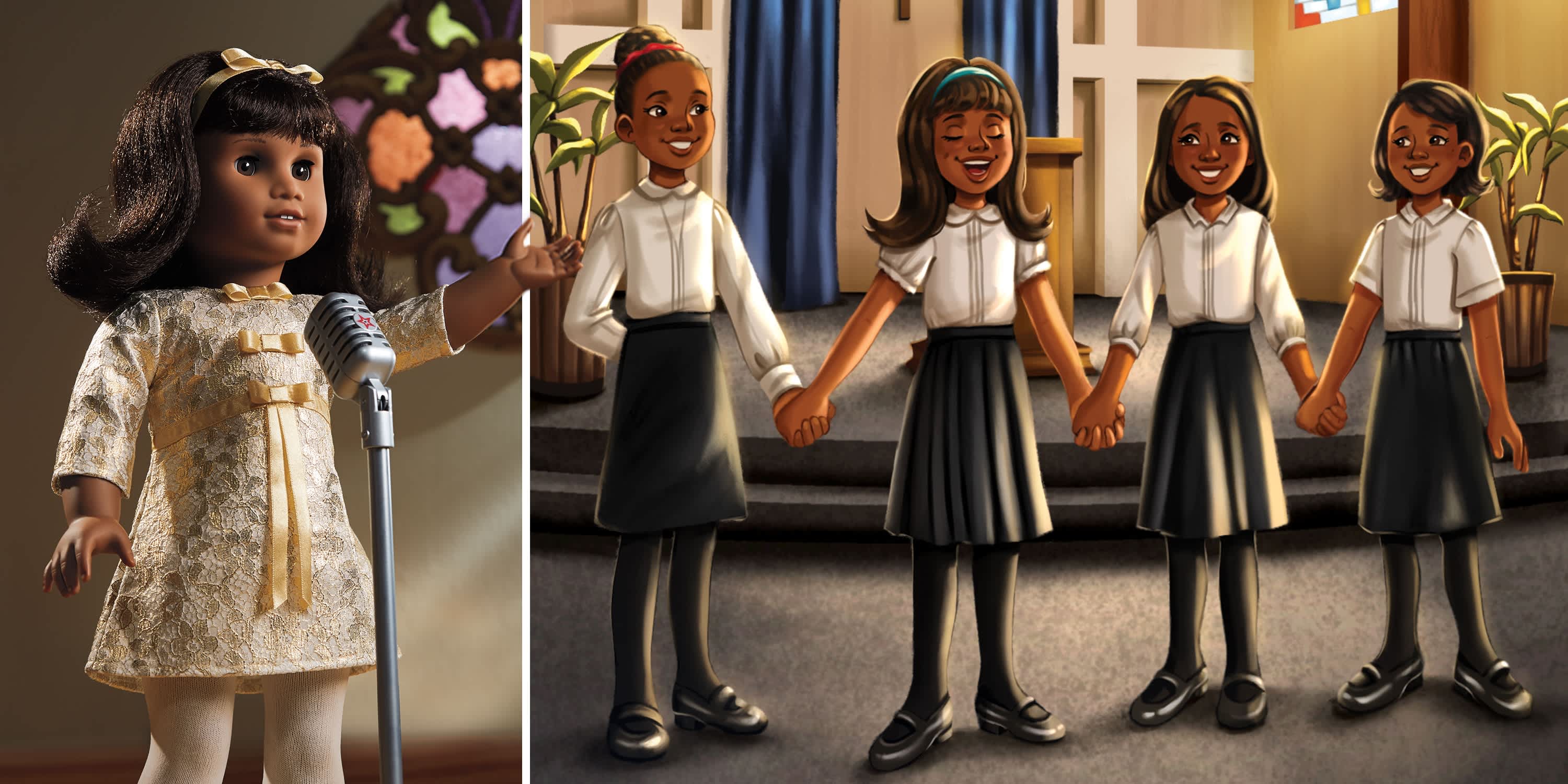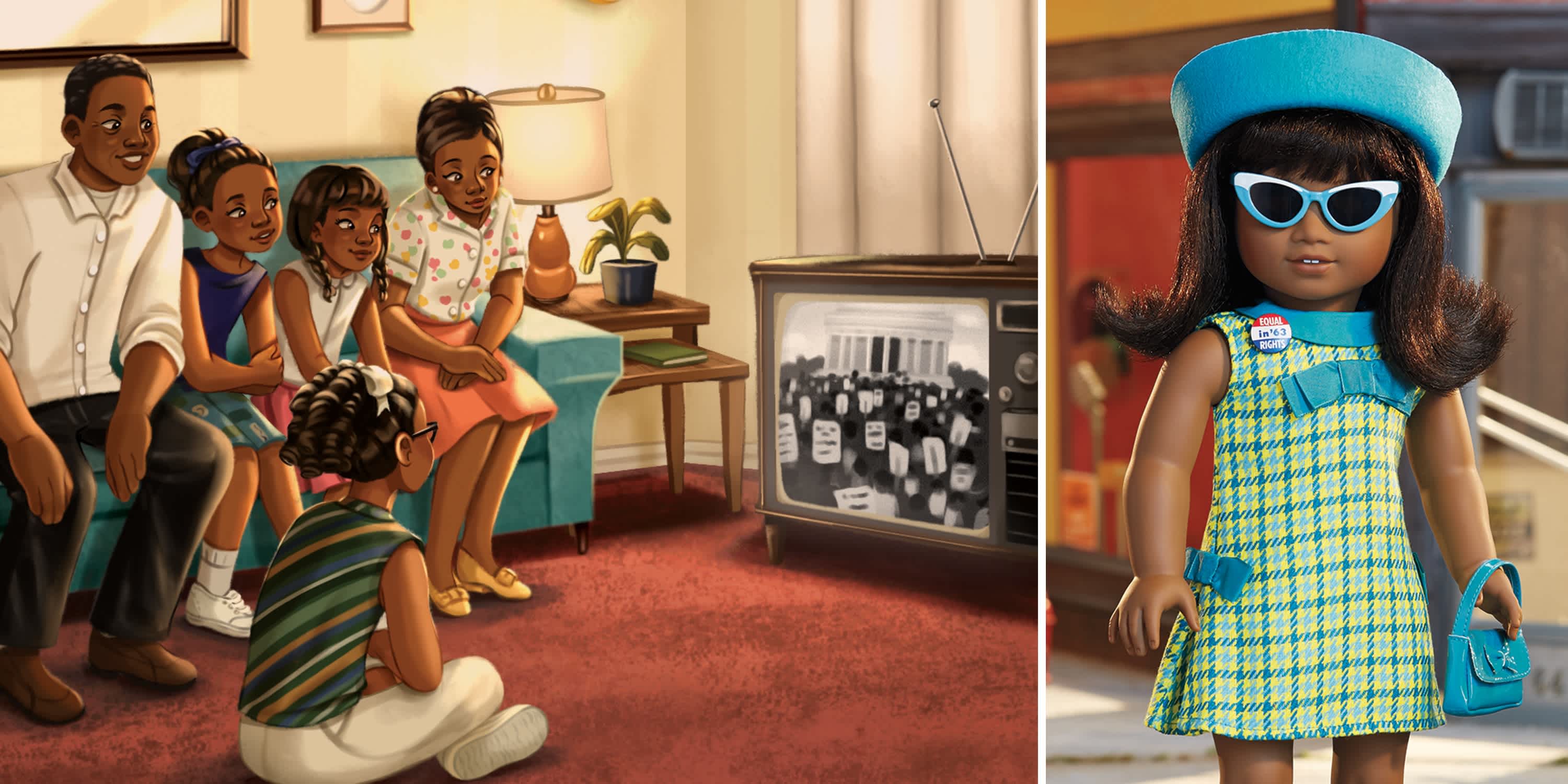Ten-year-old Melody Ellison is growing up in Detroit during the civil rights movement of the 1960s. It’s a time when people across the country are demanding equal rights for Black peole. As Melody prepares to sing her first solo at church, she searches for a song that celebrates fairness and freedom. When she hears Dr. Martin Luther King Jr. speak, Melody is inspired by his message of hope. And when she experiences discrimination for herself, Melody speaks out for for fairness and justice. Melody’s story shows how the civil rights movement is made up of hundreds or thousands of ordinary citizens—including children—who take action, face setbacks, and advance social change.

What Melody teaches girls
Melody not only witnesses pivotal events in the civil rights movement, she participates in some of them. Melody shows readers that ordinary people—including children—can do extraordinary things to change the course of history. Her story teaches girls these important lessons:

Lift your voice for what you believe in
When Melody’s chosen to sing a solo at church, she takes her time finding just the right song to express her feelings. Singing isn’t the only way she speaks up for what she believes in. When the bank won’t hire her sister because she’s Black, Melody closes her account in protest of the discrimination. When a store employee assumes Melody and her brother are shoplifters because they’re Black, she boycotts the business and pickets in front of the shop. Melody shows that she’s not too young to put her beliefs into action.

Shine for yourself and for others
As Melody prepares for her solo, she doubts her own abilities. There are others in the choir who have better voices than she does. But Melody works hard to learn a difficult song, and her grandmother tells her she’s ready to shine. After a church bombing in Birmingham kills four young girls, Melody is afraid to walk into her own church. It takes courage, but she overcomes her fear and lifts her voice for the girls who can no longer sing.

You are part of history
Melody discovers that she’s connected to the people of the past by their shared experiences. The work and sacrifice of those who came before her have allowed her her moment in history. And what she does in her moment will impact those who come after her. We are all standing on the shoulders of those who came before us. The fight for civil rights marches on.

Meet the author
Denise Lewis Patrick grew up in Natchitoches, Louisiana. Lots of relatives lived nearby, so there was always someone watching out for her and always someone to play with. She wrote and illustrated her first book when she was ten—she glued yellow cloth to cardboard for the cover and sewed the pages together on her mom’s sewing machine. Today, Denise lives in New Jersey.
Why is Melody’s story important?
One reason is that she shows how a young person can have really big feelings about what’s going on around her. Melody speaks out about what she feels when she sees something that’s unfair, or when she’s curious and has questions. Her story shows other children that it’s okay to express what you’re feeling inside, and that there are grownups who will listen and who will help and encourage you to look for answers to some of those big questions that you have.
How are you like Melody? How are you different?
I’m like Melody because I’m interested in my community. I am very curious about the world, and the things that are happening in it, and what I might do to make it better. Another way we’re alike is I grew up in a large extended family.
I’m different than Melody because I’m not a “take charge” kind of person. I have a lot of ideas about things, but Melody is different. She’s not just sitting around thinking about what needs to change, or what to do about it. She believes in action. And I actually like that a lot about Melody.
Oh, and one huge difference between myself and Melody is that I cannot sing! I like singing, I love listening to music, but I really don’t sing very well at all. So I only sing at home—mostly when everyone else is out of the house!
How was it different telling Melody’s story as a first-person illustrated diary versus a third-person novel?
Writing in a first-person diary format was a neat challenge. I had to do more than imagine Melody’s actions and reactions to people and events. I couldn’t write the diary as just a writer describing a ten-year-old girl’s feelings. I had to think about every situation in a totally different way— I had to be Melody, describing her own feelings!


Creating Melody
Melody was created with a team of advisors who shared their personal and professional experiences to authenticate her story.
Julian Bond, Chairman Emeritus, NAACP Board of Directors, and founding member of Student Nonviolent Coordinating Committee (SNCC)
Rebecca DeSchweinitz, Associate Professor of History, Brigham Young University, and author of If We Could Change the World: Young People and America’s Long Struggle for Racial Equality
Gloria House, Director and Professor Emerita, African and African American Studies, University of Michigan-Dearborn, and SNCC Field Secretary, Lowndes County, Alabama, 1963-1965
Juanita Moore, President and CEO of the Charles H. Wright Museum of African American History, Detroit, and founding executive director of the National Civil Rights Museum, Memphis, Tennessee
Thomas J. Sugrue, Professor of History, New York University, and author of Sweet Land of Liberty: The Forgotten Struggle for Civil Rights in the North
JoAnn Watson, Detroit native, Professor at Wayne County Community College, ordained minister, and former executive director of the Detroit NAACP

Shop Melody's world
Take a step into Detroit in the 1960s with Melody
©2025 American Girl. American Girl and associated trademarks are owned by American Girl, LLC.





